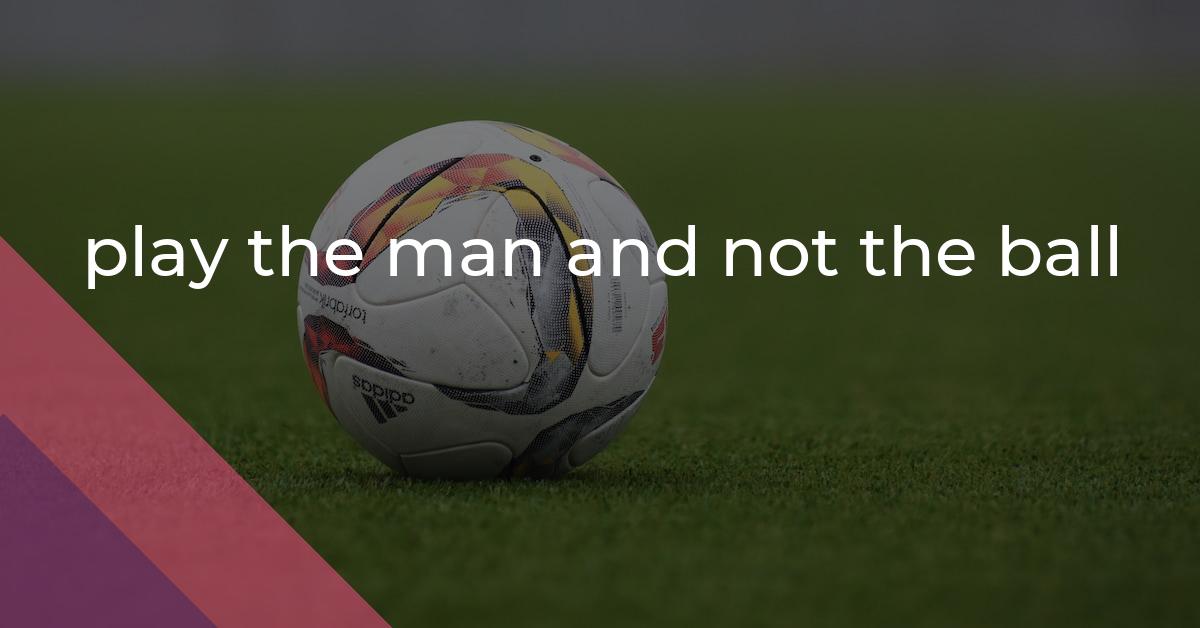play the man and not the ball: Idiom Meaning and Origin
What does ‘play the man and not the ball’ mean?
The idiom "play the man and not the ball" means to focus on attacking or criticizing someone personally instead of addressing the issue at hand. It implies a diversion from the main point of the argument and resorting to personal attacks instead.

Idiom Explorer
The idiom "play with fire" means to engage in a dangerous or risky activity, often knowing the potential consequences but still proceeding anyway.
The idiom "play up" means to emphasize or highlight something, often in order to gain attention or elicit a certain reaction. It can also refer to exaggerating or overplaying a situation or a person's abilities.
The idiom "play to the gallery" means to behave or perform in a way that is intended to gain the favor, support, or applause of the audience or the general public, often without regard for substance or sincerity.
The idiom "play the victim card" means to intentionally act like a victim in order to gain sympathy or to avoid taking responsibility for one's actions.
The idiom "play the race card" refers to the act of using one's race as a means to gain advantage in a situation or to deflect criticism by accusing others of racism.
The idiom *play the hand one is dealt* means to make the best out of a situation or circumstances that one cannot control.
The idiom "play the gender card" means to use one's gender as a way to gain advantage or manipulate a situation, typically in an unfair or strategic manner.
The idiom "play the fool" means to act silly or foolish, often for amusement or as a way to hide one's true thoughts or intentions.
"Play the ball and not the man" means to focus on the issue at hand (the ball) rather than attacking the person involved (the man).
The idiom "play the angles" means to use clever or strategic tactics to achieve a desired outcome or advantage.
Mastering the Gameplan
The idiom "play the ball and not the man" is closely related to the phrase "play the man and not the ball." Both idioms emphasize the importance of focusing on the issue or task at hand rather than getting distracted by personal attacks or individual characteristics. While "play the man and not the ball" encourages a consideration of the human element, "play the ball and not the man" suggests prioritizing objective facts and information.
When we "play the ball and not the man," we are able to maintain a clear and unbiased perspective. By focusing on the ball, or the specific issue, we avoid getting entangled in personal conflicts or biases. This enables us to make more rational and informed decisions, as we are not swayed by emotions or personal opinions.
In contrast, "play the victim card" refers to the act of portraying oneself as a victim in order to gain sympathy or manipulate others. This idiom warns against falling into the trap of playing the victim and encourages individuals to take responsibility for their actions and find constructive solutions to their problems. By avoiding the temptation to "play the victim card," we can maintain our integrity and work towards effectively resolving conflicts.
"play games" is another idiom that connects to the concept of "play the man and not the ball." When someone is said to "play games," it means they are engaging in manipulative or deceptive behavior. This idiom highlights the importance of being honest and straightforward in our interactions with others. By avoiding the temptation to play games, we can foster trust and build stronger relationships.
The idiom "play the man and not the ball" originated from the world of sports, particularly soccer. In soccer, players are often taught to prioritize defending the opposing player rather than solely focusing on the ball. By "playing the man," they can anticipate their opponent's movements and actions, allowing for a more strategic approach to the game.
This same principle can be applied beyond the realm of sports. In various situations, it is essential to consider the individuals involved and their unique circumstances. By "playing the man and not the ball" in business negotiations, for example, we can gain a deeper understanding of the other party's needs, motivations, and perspectives. This enables us to tailor our approach and ultimately achieve better outcomes.
In interpersonal relationships, "playing the man and not the ball" encourages empathy and genuine understanding. It reminds us to value the feelings and experiences of others, rather than dismissing them or focusing solely on the issue at hand. By taking the time to truly listen and acknowledge someone's perspective, we can foster meaningful communication and build stronger connections.
When faced with a decision or conflict, it can be easy to become fixated on the issue alone. However, by embodying the principle of "play the man and not the ball," we can adopt a more holistic mindset. This allows us to consider not only the objective facts and figures, but also the people involved and the human element at play.
By maintaining a friendly and informal tone throughout, we can engage our audience and convey the significance of "playing the man and not the ball." This idiom, along with its related counterparts, invite individuals to embrace a more thoughtful and empathetic approach in their personal and professional lives. Whether it be in sports, business, or relationships, remembering to "play the man and not the ball" can lead to more fruitful interactions and meaningful connections.
Example usage
Examples of how the idiom *play the man and not the ball* can be used in a sentence:
- During the debate, one of the candidates resorted to personal attacks instead of addressing the issues at hand. They were clearly playing the man and not the ball.
- In a heated argument, it is important to stay focused on the topic and not attack the person directly. It is better to play the ball and not the man.
- While negotiating a business deal, it is crucial to concentrate on the facts and not let personal animosity affect the discussions. Both parties should strive to play the man and not the ball.
The idiom *play the man and not the ball* implies that one should focus on the topic or issue at hand rather than attacking or criticizing the person involved. It emphasizes the importance of discussing ideas and facts rather than resorting to personal attacks or unrelated matters. By using this idiom, it encourages fair and respectful interactions where the focus remains on the main subject.
More "Sport" idioms



